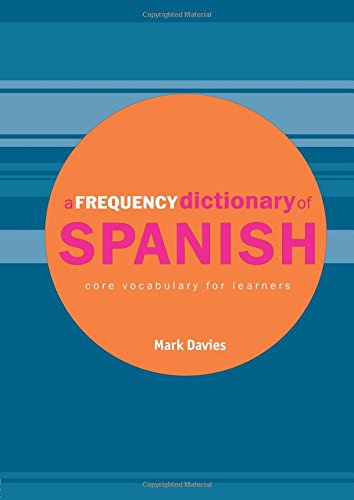 Reddit reviews A Frequency Dictionary of Spanish: Core Vocabulary for Learners (Routledge Frequency Dictionaries)
Reddit reviews A Frequency Dictionary of Spanish: Core Vocabulary for Learners (Routledge Frequency Dictionaries)
We found 4 Reddit comments about A Frequency Dictionary of Spanish: Core Vocabulary for Learners (Routledge Frequency Dictionaries). Here are the top ones, ranked by their Reddit score.

Routledge
Hi xbrightcursivex! I'm a native Spanish speaker.
The grammar that I usually use is http://www.amazon.com/Larousse-Gramatica-Lengua-Espanola-Ejercicios/dp/970220058X/ref=sr_1_1?ie=UTF8&qid=1427218026&sr=8-1&keywords=Gram%C3%A1tica+lengua+espa%C3%B1ola%2C+Larousse%2C+Irma+Mungu%C3%ADa+Zatarain.
If you just want "pure" vocabulary, use http://www.amazon.com/Frequency-Dictionary-Spanish-Vocabulary-Dictionaries/dp/0415334292/ref=sr_1_1?ie=UTF8&qid=1427218069&sr=8-1&keywords=routledge+vocabulary+spanish
But my recommendation is that if you already have a good knowledge, start reading outloud. Check http://www.epublibre.org/ for a huge collection of ebooks in Spanish.
For contemporary readings, check: https://www.goodreads.com/genres/spanish-literature
For classics, check http://lecturasindispensables.blogspot.com.ar/2013/09/mejores-novelas-literatura-hispanoamericana.html
Astromule.
In your project you might want to mention that Spanish is actually pretty normal in that its irregular verbs are among the most common verbs of the language. Think how how irregular to be is in English (am, are, is, were, was). In fact, if you look at the verbs among the 100 most frequent words in Spanish, (according to Mark Davies), the dozen most frequent are all irregular (ser, haber, estar, tener, hacer, poder, decir, ir, ver, dar, saber, and querer).
This isn't much comfort to the poor student who has to memorize all these forms, but it does explain how the irregularities are able to survive through the centuries. Practice, practice, practice!
I'll try not to make this too long, but I took a semester each year of high school and a few in college (though these were quite slow moving and didn't help nearly as much as I'd wished), but I made the most progress when I began studying on my own and working my first retail job in college, where I had to speak with a lot of the customers in Spanish. Other things that helped me get up to the level of being able to have normal conversations in Spanish (in no particular order):
-Interpreting my own train of thought into Spanish (e.g. "Hmm, what do I need to do today?" = "Hmm, que necesito hacer hoy?") or pretending I'm an interpreter anytime I heard anyone else talking, whether in person or the news anchor on t.v. (this helps you think faster).
-Find something you like and find how you can relate it to the language. I'm a big film buff, so I'd watch films with Spanish subtitles. I like being able to see the words and you can see how a lot of everyday words and phrases are translated to Spanish. You can use a notebook, at first, to write down some of the phrases to practice later, but you can also use it just as a passive method of practice, when you don't want to do straight studying. Watching interviews on YouTube with subtitles is a good method, too, (maybe even a little easier at first), as people seem to talk a little more slowly, taking more pauses. It's another good way to help pick up new words or phrases.
-Get a frequency dictionary. I only found out about them when I started learning Portuguese, but get one for Spanish. Here's a good one. It cites studies showing that something like 85% of everyday speech is comprised of only about a thousand words (like numbers, days of the week, months, verbs (like eat, sleep, work, etc.), so it can help you get the most useful vocab in the shortest amount of time. https://www.amazon.com/Frequency-Dictionary-Spanish-Vocabulary-Dictionaries/dp/0415334292
-Change your phone and social media settings to be in Spanish. That will help you passively learn new words, as you'll just keep seeing them over and over.
-Find music you like in Spanish and then look up the lyrics and what they mean. You'll be able to remember them more easily because of their connection to the music.
-Download an app on your phone for chatting with other people in your target language. I used one called HelloTalk, which allowed you to send instant messages between you and a native speaker of your target language that is learning your language. It was good for just some consistent practice.
As mentioned a few times above, try to turn as much of your passive life into opportunities to learn, and then it won't feel as much like work. So movies with subtitles, only Spanish-language music/radio/podcasts in the car, electronics' settings in Spanish, etc., all help out a lot over time.
Also, after you've gotten a decent level of understanding, I'd recommend traveling to a Spanish-speaking country. Your life will be changed by the connections you're able to make and the friends you acquire. That's worth it by itself. Then there are other benefits, like just having a new perspective on life, plus it can open a lot of employment opportunities.
Anyway, I hope some of that helps you on your journey.
I recommend A Frequency Dictionary of Spanish.
https://www.amazon.com/Frequency-Dictionary-Spanish-Vocabulary-Dictionaries/dp/0415334292